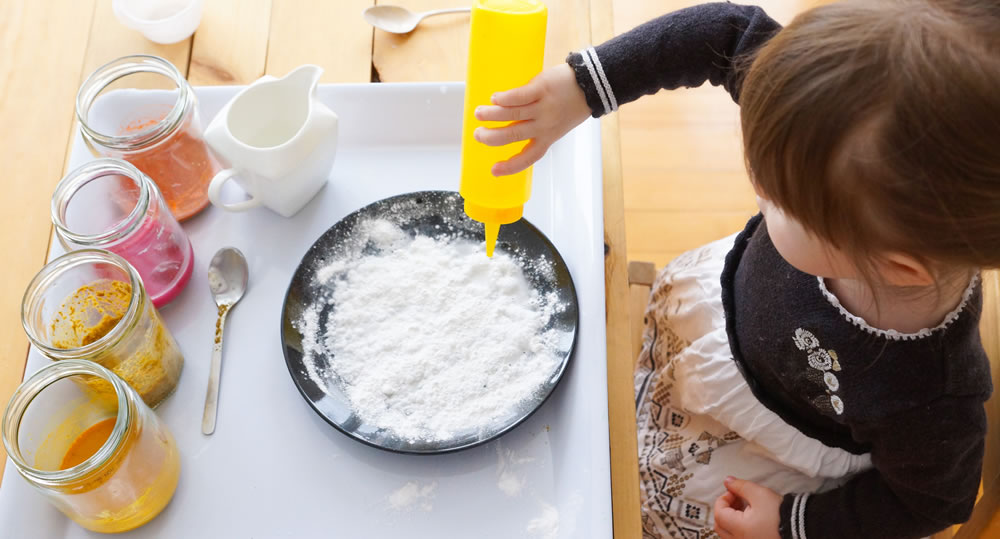9 play-based science activities that STEM skills
Published on Wednesday, 24 June 2020
Last updated on Wednesday, 21 October 2020

Science is a great way to explore ideas, make discoveries and have some fun along the way. Many experiments have that ‘Wow!’ factor for early learners, and there are lots of reasons to encourage science activities at home.
Young children learn through play, and play-based experiments help little ones to:
- Think in new ways and solve problems
- Understand cause and effect, and trial and error
- Practice their communication and teamwork skills
- Expand their vocabulary and
- Gain a better understanding of the world.
Home-based science activities are also a chance to spend quality time with a parent and have a giggle as science transforms into sensory play.
To engage your young Einstein, here are 9 simple science activities to try at home, courtesy of First Discoverers.
Create cornflower slime
Slime is wildly popular with children, and cornflour makes a version that’s both easy and educational. When you mix cornflour and water into a slime consistency, you create a non-Newtonian fluid (something that can be solid and liquid). As a result, you and your child can punch or jab the slime to feel a solid, roll it into a ball, then feel it drip through your fingers as a liquid.
Experiment with flotation
For a lesson in Buoyancy 101, fill a larger container with water and help your under five collect different items from around house. As your child drops things (like DUPLO bricks, wooden spoons and toy cars) into the water, ask them if they think the item will sink or float.
Make milk dance
To show your child what a chemical reaction looks like, simply pour full-cream milk into a saucer. Add a few drops of food colouring to the milk and dab the drops with a cotton tip dipped in washing-up liquid. The colouring will dart about in the milk, and for added effect, use a variety of colours, dabbed in different spots.
Grow something from seed
Watercress egg heads are an easy way to show your child how a plant grows, and they’re cute to boot. Just fill some empty eggshells with cotton wool and watercress seeds. Add eyes to the shell with a marker pen and wait for your little friends to sprout ‘hair’.
Build a marble run
For a whiz-bang way to develop your child’s spatial and engineering skills, collect some cardboard tubes, plastic bottles and egg cartons and build a marble run.
This project encourages teamwork, patience and creativity, and shows children how gradient affects speed. Experiment with different angles and construction and ask your child to predict how (and how fast) they think the marble will travel.
Make a magnet maze
To introduce the magic of magnets, ask your preschooler to draw a maze (or simple wriggly line) on a paper plate. Use a magnet under the plate to guide the magnet on top, and explain in simple terms, how magnets work.
Learn about the weather
The weather is a go-to topic for grown-ups and it’s also a great learning experiences for under fives. To teach your child about wind direction, you can make a wind chime or wind sock, and a plastic bottle with texta markings is a simple way to measure rainfall with a DIY rain gauge.
Investigate solubility
To test the dissolvability (or ‘solubility’) of different substances in liquid, lay out some small, see-through containers and a variety of different substances (such as sugar, oil, salt, food colouring, rice and flour). Fill the containers with water and drop a different substance in each one, asking your child if they think the substance will dissolve or not.
Cook something yummy
Edible experiments (also known as recipies!) are another fantastic way to teach your child about weights and measures, different flavours and consistencies, time management and cooking methods, and cause and effect.
There are lots of delicious ideas for fun, nutritious and kid-friendly recipies, and to help your little one experiment in the kitchen, we're giving away some personalised books below!.
All of these experiments are easy to set up and not too hard to clean up, which makes them as fun for parents as for children.
Your budding biologist, first-time physicist and young chemist will be keen to partner with you in the ‘lab’, so take the time to answer their questions, pose your own hypotheses, and explore different ways of approaching each activity.
There are more fun experiments for preschoolers in this article, and the internet is bursting with ideas that use balloons, baking soda, bubbles and more – so get set for home science!
Related Articles

5 fun science experiments for preschoolers
5 easy, but exciting, science experiments to try at home with your children.

How music-making benefits children
The developmental benefits of making music at home and simple cost effective ideas for boosting musical experiences.

How fewer toys leads to higher quality play
Raise Early Years director, Mandy Richardson describes how decluttering your child’s toy box to include a few simple open-ended play objects leads to higher quality and more sustained play.
